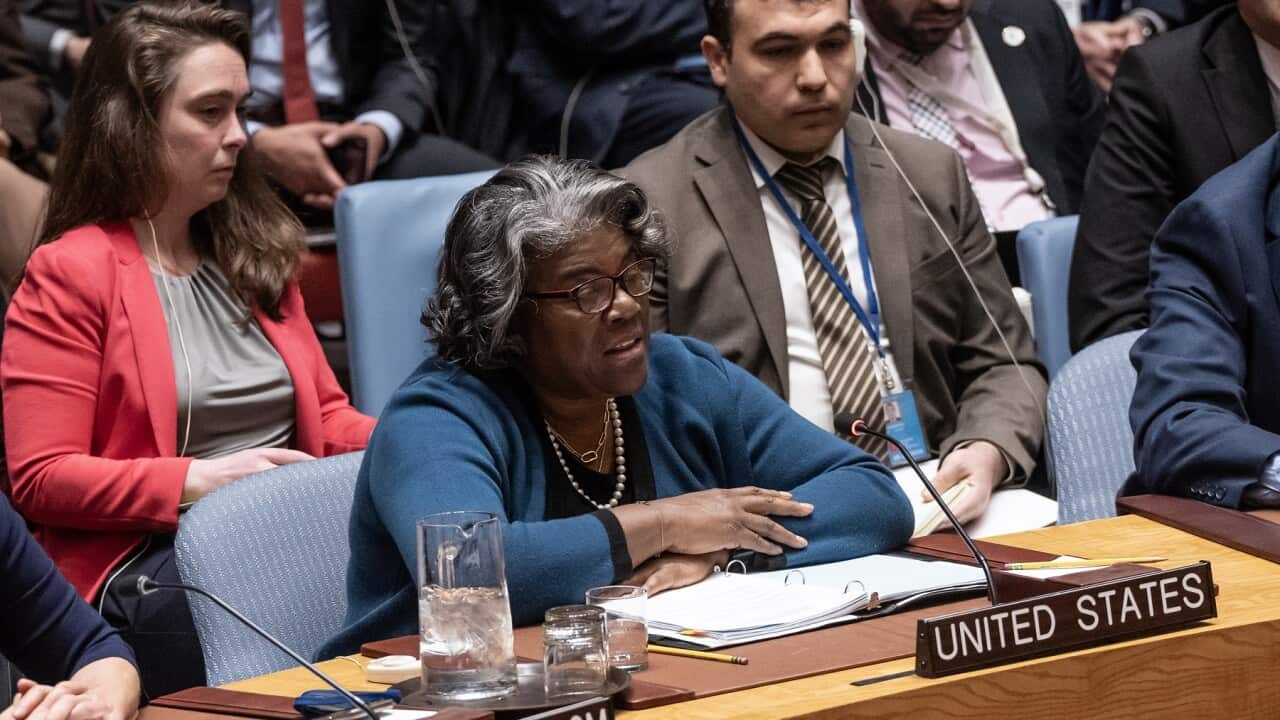TRANSCRIPT
The United States has vetoed a Security Council resolution recommending Palestine be granted full membership to the United Nations.
Twelve Council members voted in favour of the resolution, with two abstentions from the United Kingdom and Switzerland.
In order for a draft resolution to pass, at least nine members must vote in favour with none of its permanent members - China, France, Russia, the United Kingdom and the United States - using their veto power.
Robert A. Wood is the US Alternate Representative for Special Political Affairs at the United Nations.
"We have long called on the Palestinian authority to take necessary reforms to help establish the attributes of readiness for statehood and note that Hamas, a terrorist organisation, is currently exerting power and influence in Gaza, an integral part of the state envisioned in this resolution. For these reasons, the United States voted no on this Security Council resolution."
Mr Wood says the US continues to support a two-state solution and says this vote does not reflect opposition to Palestinian statehood but instead is an acknowledgment that it will only come from direct negotiations between the parties.
Hamas has reportedly responded to the veto, saying it strongly condemns the U-S using its veto power.
Meanwhile, talks have been held between US and Israeli delegates about the situation in Rafah and plans for a possible offensive by Israel in the Gazan city.
Israeli Prime Minister Benjamin Netanyahu has suggested he will go ahead with a ground offensive, which the US has repeatedly advised against.
Israel's government is also considering launching an attack on Iranian targets in response to Iran's launching of a barrage of drones and ballistic missiles last weekend against Israel.
Former Israeli Prime Minister Ehud Olmert has labelled the attack by Iran on Israel a formal declaration of war but suggests action would be untimely.
"In intercepting almost 300 drones and missiles is I think, historically unprecedented. Israel did most of it, but we never would have done, all of it without the assistance, the participation, the support, participation of the United States, Great Britain, France, and some Arab countries. So the question is, do we have to punish them because of what they did? Or can we absorb the provocation at this time and wait for the right opportunity to put Iran in the right place?"
Iran's foreign minister, Hossein Amirabdollahian, has defended Iran's attack, and warned Israel not to retaliate.
“Iran's legitimate defence and counter-measures have been concluded. Therefore, the Israeli regime, the terrorist Israeli regime, must be compelled to stop any further military adventurism against our interests. Certainly, in case of any use of force by the Israeli regime and of violating our sovereignty, the Islamic Republic of Iran will not hesitate a bit to assert its inherent right to give a decisive and proper response to it to make the regime regret its actions.”
The US is trying to dissuade Israel from retaliatory strikes to avoid inflaming an already tense situation.
A similar message has come from the United Nations, with Secretary-General Antonio Guterres saying Israel's stated commitments to improve aid access in Gaza has been limited.
"Apparent progress in one area is often cancelled out by delays and restrictions elsewhere. For example, although the Israeli authorities have cleared more aid convoys, those clearances are often granted when it is too late in the day to make deliveries and return safely. One can say that our personnel cannot operate in darkness in a war zone littered with unexploded ordnance."
In the West Bank city of Ramallah, the Palestinian government has called on US officials to intervene immediately to stop ongoing Israeli violence against Palestinian people.













